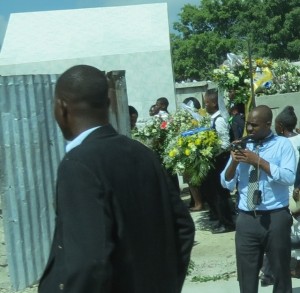
Curious teens climbed the walls to dance to the beat of the rah-rah band get a better view of the procession.
Last Wednesday, when I boarded the 9:45 flight from Miami to Port-au-Prince with Casey, Gigi, and Mary, I was struck by conflicting senses that I knew what to expect and that I have never known what to expect. I fully anticipated that traffic would be slow and chaotic, but the ride would be endlessly fascinating. The language would be tricky but the smiles would be genuine. The heat and dust would be oppressive but tropical breezes and Prestige at the end of the day would be blessed. I have come to expect all of these things. But always, always there something that lies in wait; something beyond my experience base that finds its chance to be added.
This time it was a funeral procession.
It was mid-morning and we were motoring purposefully along when our progress inexplicably slowed to a crawl. There was a string of cars, and a large number of interspersed pedestrians seemed to be following them. A few blocks along, Franz, our intrepid Haitian driver, spotted the hearse ahead. “Ah,” he said, “a funeral. Well, it is Saturday. Lots of funerals on Saturdays. This could be a while.”
A few blocks later, we came to a “dead stop.” (Sorry, couldn’t resist!) The hearse had reached the cemetery and the crowd had begun to swell.
Up ahead we could hear a rah-rah band; drums and vuvuzelas creating a wild, not quite melodic but definitely rhythmic cacophony. The cemetery was surrounded by a large cinderblock wall, and agile teenagers scrambled to the top and bopped to the beat. Moments later, the coffin appeared, born by black-suited pall bearers, who began to dance vigorously with their heavy load up and down the street. Women and girls dazzling in their finery cavorted behind the coffin, swirling voluminous floral arrangements of yellows and whites. This went on for fifteen minutes or so; a spectacle of funerary custom that I could certainly recognize, but that was far from the sedate traditions of my own experience.
I have read many times that Haitians celebrate their culture by giving thanks for those who have lived before them. They believe their future depends on the ways they honor their ancestors. What I observed, I think, is that very thing. The Haitian way of honoring the dead is to mourn, yes, but also to celebrate the life that was lived. To see that played out was wonderfully unexpected.
Contributed by Linda for It’s Cactus

